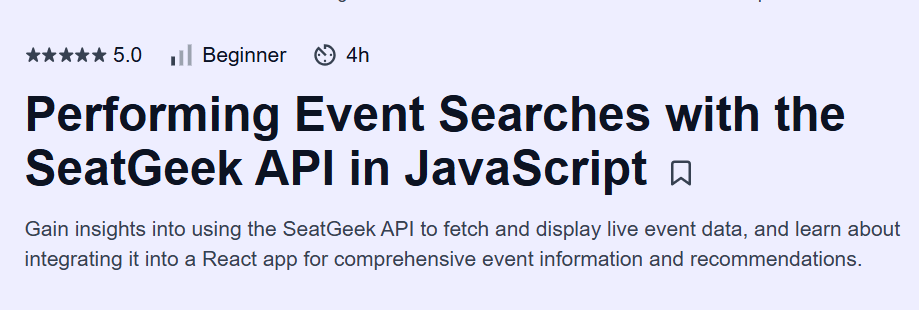What will you learn in Performing Event Searches with the SeatGeek API in JavaScript Course
Authenticate and interact with the SeatGeek REST API using JavaScript (fetch/Axios)
Perform event searches with location, date-range, and performer filters via API query parameters
Parse and handle JSON responses to extract event details, venues, and performer information
Implement pagination and rate-limit handling for robust data retrieval
Integrate SeatGeek API calls into a front-end or Node.js application, displaying results dynamically
Program Overview
Module 1: Course Introduction & API Overview
⏳ 10 minutes
Topics: SeatGeek API capabilities, obtaining a client ID/secret, setup prerequisites
Hands-on: Register for API credentials and make your first authenticated request
Module 2: JavaScript HTTP Basics
⏳ 15 minutes
Topics: Using
fetchvs. Axios, handling promises, error handling patternsHands-on: Write a helper function to wrap API calls with proper headers and query strings
Module 3: Exploring Core Endpoints
⏳ 30 minutes
Topics:
/events,/performers,/venues,/taxonomiesendpoints and parametersHands-on: Build functions to search events by keyword, location, and date
Module 4: Advanced Querying & Pagination
⏳ 20 minutes
Topics: Date-range filters, location-based radius searches, pagination (
per_page/page)Hands-on: Implement a paginated event search that aggregates results across multiple pages
Module 5: Front-End Integration
⏳ 40 minutes
Topics: Rendering results in the DOM, debounced search inputs, loading states
Hands-on: Create a simple web page with a search form that displays event cards dynamically
Module 6: Node.js & Server-Side Usage
⏳ 30 minutes
Topics: Using the SeatGeek API from a Node.js backend, caching strategies, environment variables
Hands-on: Build an Express route that proxies event searches to the SeatGeek API
Module 7: Error Handling & Rate Limits
⏳ 15 minutes
Topics: HTTP error codes, retry/backoff strategies, monitoring API usage
Hands-on: Enhance your helper function to gracefully handle 429 (Too Many Requests) with exponential backoff
Module 8: Conclusion & Extension Ideas
⏳ 10 minutes
Topics: Recap, suggestions for feature enhancements (ticket links, map integration)
Hands-on: Plan additions like “load more” buttons, calendar integration, or personalized recommendations
Get certificate
Job Outlook
Front-End Developer / API Integrator: $80,000–$120,000/year — build interactive UIs backed by third-party APIs
Full-Stack JavaScript Engineer: $85,000–$130,000/year — integrate live-event data into web applications
Data Engineer (Real-Time Analytics): $90,000–$140,000/year — ingest and process event streams for dashboards
Specification: Performing Event Searches with the SeatGeek API in JavaScript
|





